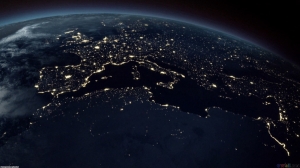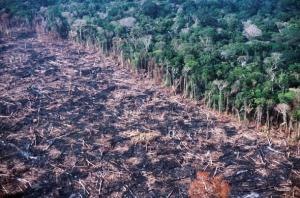By Enrique Lescure
The discussion on human nature

Jacque Fresco (whom I presuppose you all know about) is basing his arguments for the design for The Venus Project, on his claim that it is scientifically proven that human beings are blank slates that are adapting to their environments, and that heritage and genetics play no role.
His main argument is that human beings behave “capitalistically” in a capitalist society, and will automatically adjust to what he terms a “Resource Based Economy” (RBE) on the basis of this purported scientific truth.
This claim is often the first one that representatives or supporters of various RBE movements are using against people who question whether or not a transition to an entirely untested system is a wise idea.
Sadly, the scientific foundations for this argument are very shaky, and in its pure form, the argument is simply flawed. I will devote this article not on what human nature is, but on the debate on human nature and its relations to science, ideology and human behaviour, in order to try to explain why Jacque Fresco and other RBE followers are using this argument to sell The Venus Project.
What science is, and is not

Often, when laypersons meet at pubs, private places or parks to discuss, and the topic is on some subject they’ve perhaps heard on the radio or seen on Youtube, they often talk about that “the scientists have said that…”, or “that is not true, because the scientists…”
Other people, often belonging to the minority of people susceptible to conspiracy thinking, believe that the scientists are out to destroy society, or “fabricate global warming”, that there is a nefarious Agenda 21 (which is almost unrecognisable from the real Agenda 21) which aims to depopulate Earth in order to save it.
No matter if you view “the scientists” as some sort of revered final authority which stands above the understanding of “ordinary commoners”, or see them as a nefarious cabal intending to upheaval and mischief, you see yourself as separate from them, and them as having access to knowledge and information which you could never hope to attain.
That is not what science is.
Science is from the beginning two different methodologies combined with documentation and archiving. The two methodologies (there are more, but these two are the main ones that are utilised), empiricism and rationalism.
Empiricism is basically experience-based learning, where scientists tests their hypotheses by for example mixing two or more elements or conducting testing under controlled conditions. Rationalism is a process whereby the possible reasons for the outcomes of the experiments should be weighed against one another until those proven less likely are scrapped.
In our modern age, the ideal is that this entire process should be monitored, by those involved writing their hypotheses, methodologies, results and conclusions and subject it to peer review. The ideal is that the experiments should be repeatable and that even a scientist with opposing views would find the same results as the first scientist.
Of course, pride, research grants, professor positions and politics inside faculties are playing a role, and there have been cases of fraud and academic corruption. Yet that is not primarily the fault of the process, but rather a testament to the kind of system that the process is occurring within. It is also a testament to the human tendency to factionalise, especially amongst dominant males.
This however can be corrected, as science – unlike many religions and ideologies – is self-correcting. Ambitious scientists are welcome to challenge established wisdom and question old beliefs, and in this way our understanding of the world is improved.
How political and religious movements are (mis)using science

During the late 19th century, the European colonial powers divided the continent of Africa between themselves, subjecting the indigenous nations of brutal exploitation and oppression. However, to admit that for the home audience (and possibly for oneself, as an exploiter) would create a psychological scar. Thus, the imperialists devised for themselves and for the public arguments for why they “ought” to “civilize” Africa.
One of the obvious arguments was that the inhabitants had not received Christ yet, and therefore it was pivotal to send missionaires to Africa to bring “the ignorant savages” into the fold of “Christian Civilization”.
A perhaps quite unexpected argument, which however reminds a bit of the arguments for NATO-led military interventions usually made at our contemporary era, was to “protect” the peoples of Subsaharan Africa from Arab slavers, selling slaves to the markets of the Ottoman Empire.
The nastiest – and in a dark way the most “honest” – answer why, was provided by ideologists and by scientists of that era who acted like ideologists. They were basing their theories on Charles Darwin’s theories, written in his two books The Origin of Species and Descent of Man, and chose to interpret the books in such a manner that they believed there was some kind of evolutionary struggle between the “inferior” and “superior” races of mankind.
According to this view, the Europeans had “the right” to impose colonial control upon Africa, because the European states were stronger than the African kingdoms and had superior weapons. This kind of motivation had little that differed it from the motivations found on steles in Mesopotamia, raised by the kings of the cruel Assyrian Empire. But the darwinian explanation became popular amongst intellectual circles in Europe and the Americas because it was “scientifically based” and had support from large parts of the scientific establishment.
Herbert Spencer took this cruel ideology masked as science, and applied it on the class issues in Europe at the time. Arguing against social reforms and social justice, he claimed that those who were poor were sentenced to poverty not by an unjust political system but by their “evolutionary inferiority” (genetics were not known at that time). Thus, that some people died very young because of lethal working conditions and were subjected to starving and homelessness was none other’s fault than themselves, for having been born with such “inferior bodies and minds”.
This argument has – by the way – made a reappearance in the Anglo-Saxon world, as has the argument that some races are intellectually inferior. This has been contested however.
On the progressive side, similar sweeping scientific claims have been made about for example gender relations issues and LGBT issues. While those who seek to preserve existing hierarchies delve into science in order to justify social injustices, progressives delve into science to fight social injustices.
The first example of this kind of use of science is the theory – supported by a lot of feminist researchers – that all the differences between the sexes can be attributable to patriarchy and to the traditional cultural gender norms that women and men have been forced to live under, and that nothing – nothing – is affected by human biology. From this follows that society should actively intervene in order to subvert these norms, abolish the genders as social constructs and allow all human beings to liberate themselves and define their own identity independent from the norms and expectations from society, an ideological goal which I find as noble as a RBE.
The second theory that is usually presented by progressives is that humans are born with sexual preferences, and therefore people have the right to express their sexual orientation by entering relationships with other grown-up adults. It is understandable that LGBT activists are using this defence in order to try to make a homophobic society tolerate the presence of people with non-hetero orientations.
What is wrong with using science like this?
 When science is used to motivate political agendas, it can increasingly fall under the risk of being reduced to a dogma, especially if the political agenda happens to be dominant within an institution. Scientists who have dissenting theories or who’s academic honesty has led them into other conclusions can then be subjected to peer pressure and be marginalised within academia. A science which can hardly be questioned from within leaps the risk of turning into ideology – an ideology which motivates itself not by the merits and consistency of its values but by claiming the reverence of being scientific, while demanding to not be questioned out of ideological concerns.
When science is used to motivate political agendas, it can increasingly fall under the risk of being reduced to a dogma, especially if the political agenda happens to be dominant within an institution. Scientists who have dissenting theories or who’s academic honesty has led them into other conclusions can then be subjected to peer pressure and be marginalised within academia. A science which can hardly be questioned from within leaps the risk of turning into ideology – an ideology which motivates itself not by the merits and consistency of its values but by claiming the reverence of being scientific, while demanding to not be questioned out of ideological concerns.
If we take our progressive examples, feminism would not fall to pieces if it is proven that what we within human societies have seen as gender-specific behaviours are partially based on biological mechanisms such as hormones affecting the amygdala, since it does not follow that it then would mean that women must conform to patriarchal norms or that we should not question such norms any more.
And does it follow that we would have the right to oppress LGBT people if it was shown that sexual orientations can develop by a mixture of genetic conditions, choice and environmental factors? I don’t believe that, and I believe that the argument that “we have to accept LGBT people because they are born that way” deprives human beings from the power of their own destinies, and also indirectly implies that society would be perfectly within that right if they weren’t “born that way”.
Summa summarum…

Rightist activists tend to argue that humans are entirely driven by genes and biology, and are therefore inherently unequal, and that “capitalism is in human nature”. All gender behaviour differences are genetic, but homosexuality is a free choice and “gays should straighten up”. All other economic systems than free market capitalism are bound to fail due to “the laws of nature”, and races are unequal…
Leftist activists on the other hand, tend to argue that humans are more driven by environment than genes, that the first human societies were egalitarian, and that humans have the freedom to choose how to form their communities. Gender behaviour differences are instituted through Patriarchy, sexual orientations are something that humans are born with, and socialism lies much more in human nature than capitalism. Races do not exist…
Yes I admit it, these two descriptions of two activists are stereotypical, and probably neither one is existing in pure form as an ideological activist in the real world. But these kinds of supposedly “scientific” arguments used with the faint hope of ending debates that doesn’t change the mind of anyone partaking (especially not between two people) have cropped up in discussions numerous times, until people almost repeat them automatically.
The point is, when you use science primarily as a mean to support your political agenda, you are not in fact advancing your political agenda (you are giving it crutches which it probably doesn’t need), and you are turning science into a dogma. The academic world is probably fraught with bias already, but fighting bias with bias is never a good idea, and will inevitably create such monstrosities as Biblical Archeology and Intelligent Design, “sciences” entirely devoted to spreading agendas.
Science is not about believing what you want to believe, but to boldly follow evidence, wherever it might lead you. And yes, established scientists since long ago has often been bad on that, and allowed their bias and political opinions to affect their work. They are only human after all.
How to correctly use science
 You have values and sentiments, right? You want the society to progress in a specific direction, and are highly motivated. Perhaps you are even ascribing to a consistent ideology. Society is not working so well as it could, and you are ready to struggle to move it into a direction that you’ll view as more beneficial for humanity and/or the environment.
You have values and sentiments, right? You want the society to progress in a specific direction, and are highly motivated. Perhaps you are even ascribing to a consistent ideology. Society is not working so well as it could, and you are ready to struggle to move it into a direction that you’ll view as more beneficial for humanity and/or the environment.
What you should do is that you should educate yourself, and use information available and judge it critically, no matter if you agree with it or not. If you get into a position of responsibility, science is of great aid since it tells which routes are more possible and which routes are less. You do not need to change your values if established science would find out something less flattering about your species, the environment or social structures, instead you should use that new knowledge as a way to better be able to realise your values in reality. That is not possible if you decide to use the scientific texts you agree with as dogma.
The Soviet Union collapsed not because of war, but largely because its academia and research was heavily restricted by Marxist-Leninist dogma, which together with the police state created an unwillingness to question the collective farms, the static prices or the command economy. The Islamic world stagnated largely because the Ash’ari theological school (which stressed the absolute predetermination by God’s will of everything that happens) triumphed over the Mu’tazilites and their more open interpretations of scripture. If the Mu’tazilites had won that struggle, it wouldn’t be inconceivable that the Islamic world could have pioneered the scientific revolution. Greek science stagnated during the Roman Era, largely because Plato and Aristotle were treated as authorities which could not be questioned by the literate classes.
So use science as a map, but not as a guiding light for your heart. Use it as a tool to achieve a goal. But do not for all what matters in your mind mix up the tool itself with the goal in your heart.
















 aiming for a d’etente with the West
aiming for a d’etente with the West

















